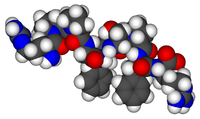
Photo from wikipedia
Myocardial infarction (MI) eventually exacerbates inflammatory response due to the release of inflammatory and pro-inflammatory factors. The aim of this study is to explore the protective efficacy of piperine supplementation… Click to show full abstract
Myocardial infarction (MI) eventually exacerbates inflammatory response due to the release of inflammatory and pro-inflammatory factors. The aim of this study is to explore the protective efficacy of piperine supplementation against the inflammatory response in isoproterenol (ISO)-induced MI. Masson Trichome staining was executed to determine myocardial tissue architecture. Immunohistochemistry was performed for IL-6, TNF-α. RT-PCR studies were performed to ascertain the gene expression of IL-6, TNF-α, iNOS, eNOS, MMP-2, MMP-9, and collagen-III. Western blotting was performed to determine expression of HIF-1α, VEGF, Nrf-2, NF-ƙB, Cox-2, p-38, phospho-p38, ERK-1/2, phospho-ERK-1/2, and collagen-I. HIF-1α, VEGF, and iNOS expression were significantly upregulated with concomitant decline in eNOS expression in the heart myocardial tissue of rats received ISO alone whereas piperine pretreatment prevented these changes in ISO administered rats. Current results revealed ROS-mediated activation of MAPKs, namely, p-p38, p-ERK1/2 in the heart tissue of ISO administered group. Piperine pretreatment significantly prevented these changes in ISO treated group. NF-κB is involved in the modulation of gene expressions responsible for tissue repair. ISO-induced NF-κB-p65 expression was significantly reduced in the group pretreated with piperine and mitigated extent of myocardial inflammation. A significant increase in cardiac fibrosis upon ISO treatment was reported due to the increased hydroxyproline content, MMP-2 & 9 and upregulation of collagen-I protein compared to control group. All these cardiac hypertrophy markers were decreased in 'piperine pretreated ISO administered group' compared to group received ISO injection. Current findings concluded that piperine as a nutritional intervention could prevent inflammation of myocardium in ISO-induced MI.
Journal Title: European journal of pharmacology
Year Published: 2020
Link to full text (if available)
Share on Social Media: Sign Up to like & get
recommendations!